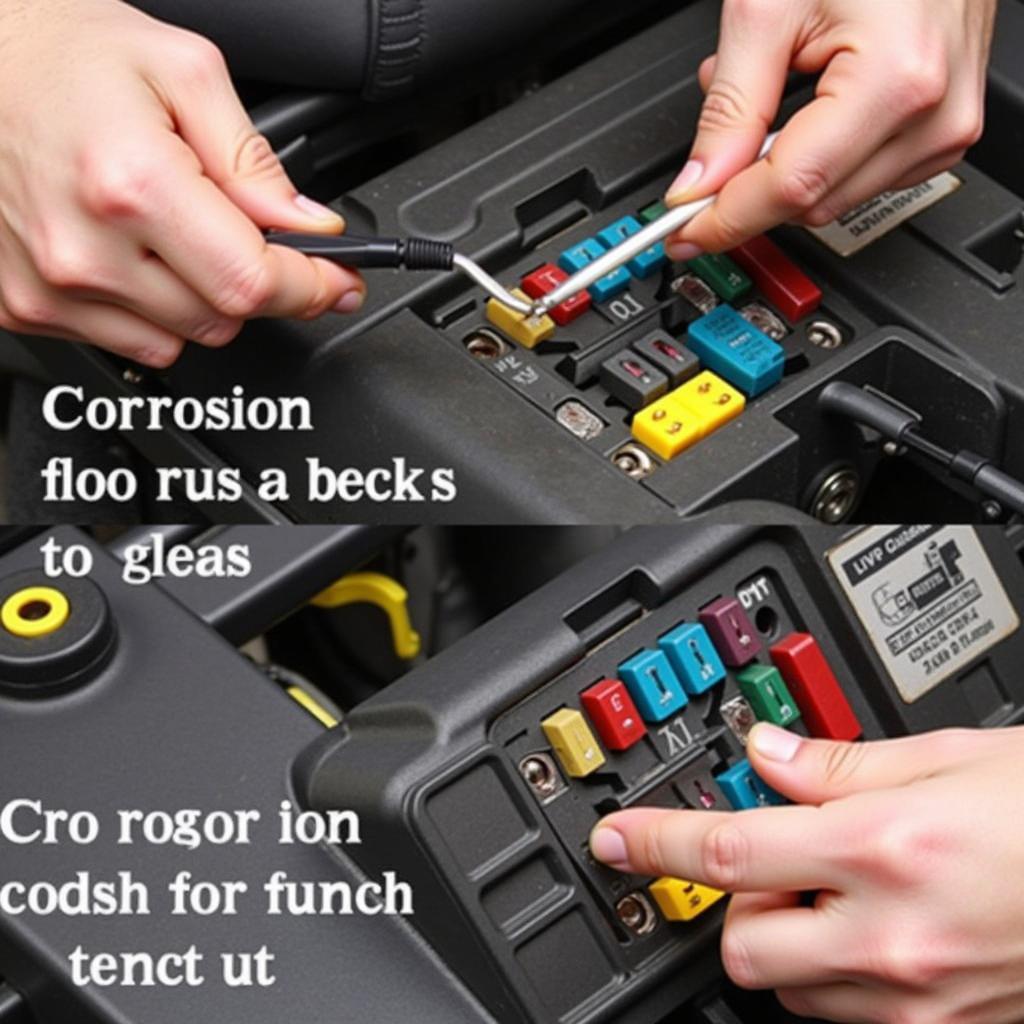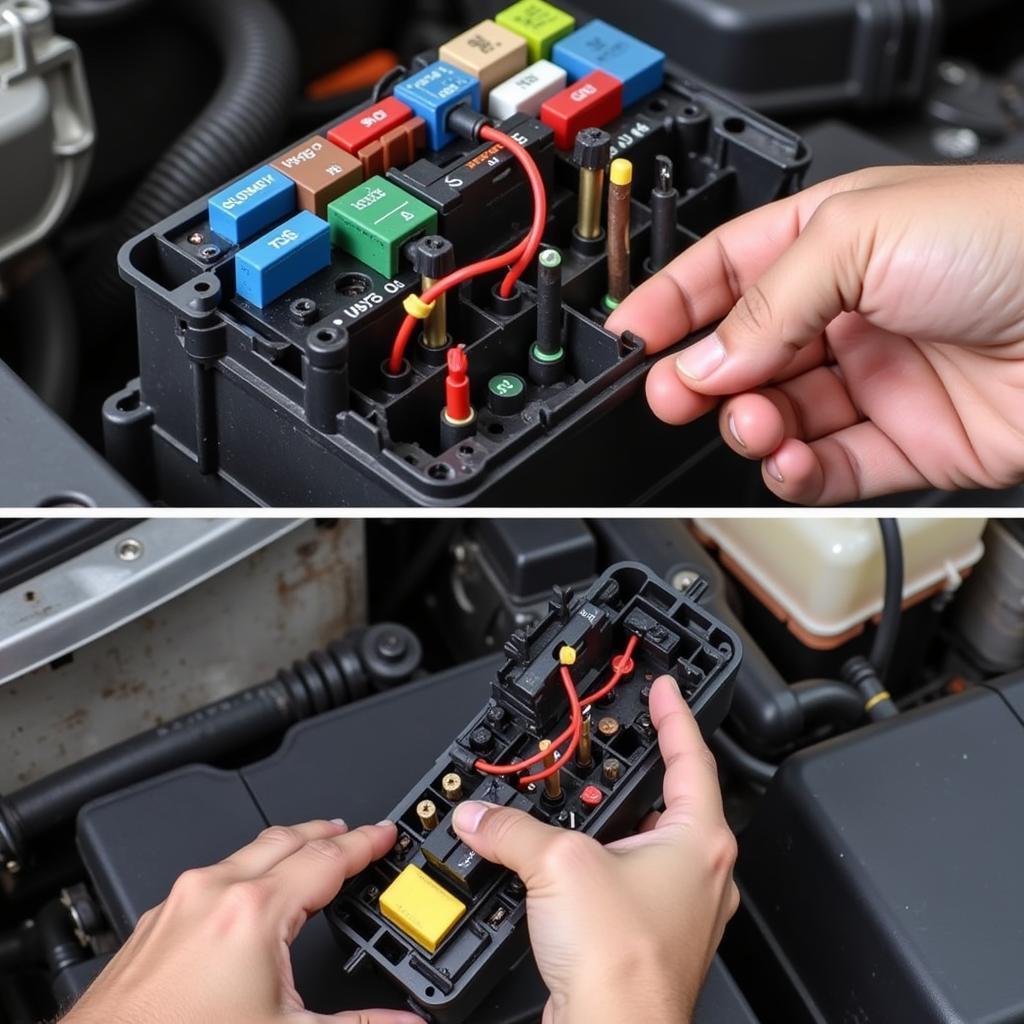A car’s fuse box, the unsung hero of your vehicle’s electrical system, can indeed be repaired in most cases. Understanding its function and the common issues it faces is crucial for any car owner. This article will delve into the repairability of car fuse boxes, common problems, troubleshooting tips, and when professional help is necessary. We’ll cover everything you need to know about this critical component.
A fuse box acts as the central hub, protecting your car’s electrical circuits from overload. Think of it as a safeguard against power surges that could damage expensive components. It houses a collection of fuses, each designed to protect a specific circuit. When a circuit draws too much current, the corresponding fuse blows, breaking the circuit and preventing damage. Rather than replacing the entire fuse box, individual fuses are typically replaced, which is a relatively simple and inexpensive fix. However, sometimes the problem lies within the fuse box itself. Can a fuse box for a car be repaired then? Absolutely.
If you’re experiencing persistent electrical issues even after replacing fuses, the fuse box itself might be the culprit. Corrosion, loose connections, or internal damage can all contribute to fuse box malfunction. Troubleshooting involves inspecting the fuse box for any visible damage, checking for loose wires, and testing the fuses with a multimeter. Learning how to diagnose and address these problems can save you a trip to the mechanic and keep your car running smoothly.
Common Fuse Box Issues and Repairs
One of the most frequent issues is a blown fuse. Identifying a blown fuse is relatively easy – the metal filament inside will be broken. Simply replace it with a new fuse of the same amperage. Never use a higher amperage fuse as this could cause a fire hazard.
Another common problem is corrosion. Corrosion can disrupt the electrical connections within the fuse box. Cleaning the terminals with a wire brush or contact cleaner can often resolve this issue. In some cases, corroded wires or terminals may need to be replaced.
Loose connections can also cause problems. Ensure all wires are securely attached to the fuse box. Wiggle the wires gently to check for looseness. If a wire is loose, tighten the connection or replace the terminal if necessary.
Sometimes, the fuse box itself can crack or become damaged. In this case, repairing the cracks with epoxy or replacing the entire fuse box might be necessary.
If your car audio system is malfunctioning due to a suspected fuse box issue, you might find helpful information in our guide on how to repair car audio system.
Troubleshooting Your Car’s Fuse Box
Before you start any repairs, always disconnect the negative battery cable. This crucial step prevents accidental short circuits and protects you from electrical shock. Next, locate your car’s fuse box. It’s typically found under the dashboard, in the glove compartment, or under the hood. Consult your owner’s manual for the exact location.
Once you’ve located the fuse box, inspect it visually. Look for any signs of damage, such as cracks, burns, or corrosion. Check the fuses for any blown ones. If you find a blown fuse, replace it with a new one of the same amperage.
If you suspect a loose connection, wiggle the wires connected to the fuse box. If a wire is loose, tighten the connection or replace the terminal if necessary. If you’re having trouble with your car’s MP3 player, check out our article on how to repair car mp3 player for potential solutions. Sometimes, the problem might lie in a related electrical component.
 Cleaning Corrosion from a Car Fuse Box Terminals
Cleaning Corrosion from a Car Fuse Box Terminals
When to Seek Professional Help
While many fuse box issues can be resolved with basic DIY skills, some situations require professional assistance. If you’ve tried troubleshooting and the problem persists, it’s best to consult a qualified mechanic. They have the expertise and tools to diagnose and repair more complex electrical problems. For instance, if your rearview mirror isn’t working, you might want to see our guide on how to repair i20 car rear view mirror, as the issue might not always be the fuse box.
If you’re uncomfortable working with electrical components, it’s always best to err on the side of caution and seek professional help. Working with electricity can be dangerous if you’re not experienced. A mechanic can safely and efficiently diagnose and repair any fuse box issues.
Do JBL car speakers need repairing? Our article can jbl car speakers repairable offers insights into common speaker problems and solutions. This can be helpful if your audio system is affected.
Conclusion
Can a fuse box for a car be repaired? Yes, in many cases, it can. By understanding the function of a fuse box and common issues it faces, you can troubleshoot and often repair minor problems yourself. However, for more complex issues, seeking professional help is always the best course of action. Regular maintenance and prompt attention to electrical problems can help extend the lifespan of your car’s fuse box and keep your vehicle running smoothly for years to come.
 Replacing a Car Fuse Box
Replacing a Car Fuse Box
If you’re experiencing bass disturbances in your car speakers, it’s worth checking out how to repair car speaker bass disturbance, as it could be related to the fuse box or other audio components.
FAQ
- What does a car fuse box do? It protects electrical circuits from overloads.
- How do I know if a fuse is blown? The metal filament inside will be broken.
- What causes a fuse to blow? An overload in the electrical circuit.
- Can I repair a cracked fuse box? Sometimes, with epoxy, but replacement is often necessary.
- When should I call a mechanic? If troubleshooting doesn’t resolve the issue or if you’re uncomfortable working with electrical components.
- How can I prevent fuse box problems? Regular maintenance and addressing electrical problems promptly.
- Where is the fuse box usually located? Under the dashboard, in the glove compartment, or under the hood.
Need Help?
If you need assistance with your car’s fuse box or any other auto service needs, please contact us via WhatsApp: +1(641)206-8880 or Email: [email protected]. Our 24/7 customer support team is ready to help.


